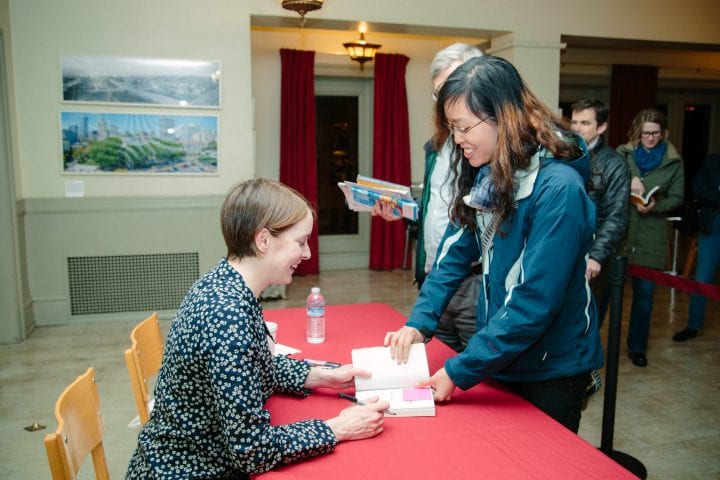
On Emily St. John Mandel and Station Eleven
April 1, 2016
By Justine Chan
A few months after the SARS outbreak in Hong Kong, my family and I took our usual summer family trip there. For some bizarre reason, the travel package even threw in a free month-long stay at the gaudy Metropole Hotel, the “epicenter” of the SARS outbreak. And so, my parents stayed there with all the suitcases and us kids stayed with my aunt and uncle. And we were all fine. I remember that there were still a lot of people wearing surgical masks out in the streets. I also remember, being the teenager I was, noticing that no one wore shorts that summer despite the sweltering heat and humidity. And I remember my family and I joked about SARS and the Metropole a lot even though it wasn’t that funny. I believe, though, we had to joke because we were so lucky.
Thanks to the novel Station Eleven by Emily St. John Mandel, I have been thinking a lot lately about plagues and apocalypses.

I’ve also been thinking about Delano Island and the Pacific Northwest, the flatlands of the Midwest, New York; my family, my friends, my relatives in Hong Kong; oranges, telephones, canoes, kilns; bookbinding, cooking, hiking; water and rivers; letters, road-trips and highways and maps; daylight in spring, how people talk, how airplanes stay suspended in the sky, how far away the mountains are . . . And how fragile this world is, even with all our technology and modernity seeming to hold everything together. I’ve become a bit more obsessed with our world, a bit more in love with it.
It was my dear poet friend Alison Stagner who first recommended Station Eleven to me. She said I might like it because it’s about a traveling Shakespeare troupe in a post-apocalyptic world and of course, magical and poetic. I’ve never been one for zombies or post-apocalyptic narratives, but I have a soft spot for traveling Shakespeare troupes and summer Shakespeare festivals. It seems no matter where I’ve traveled, I always seem to find a patch of grass covered in blankets, picnickers, clouds of fireflies in dusk light, watching a Shakespeare play unfold. I simply had to read Station Eleven.
I ended up reading it very slowly, over a three-week period. It took me forever to even finish the last couple of pages; I had lived in that book, that world, for so long that I couldn’t quite bear to finish it. I tell everyone to read it. I sometimes have dreams set in Mandel’s oddly majestic and beautiful post-apocalyptic world. I was so thrilled to get to see her lecture as a part of SAL’s Literary Arts Series on March 23rd (and have my copy of Station Eleven signed afterwards!).

As a prose writer and poet who does extensive research before embarking on any writing, I really appreciated hearing Mandel so eloquently discuss her own research process and writing choices behind Station Eleven, making the novel so real and poignant. Her stories about Shakespeare’s own tragic brushes with the plague, how the fear and sorrow manifest in his plays, were absolutely fascinating. Particularly, I found her story about George Vancouver exploring islands all empty and devastated with smallpox incredibly haunting and sad. It was good to hear her acknowledge this terrible history so we can keep talking about it. Moreover, it was refreshing and important that she addressed how even today the threat of epidemics is still very much real and frightening, and how mysterious illness, and life itself, is.

I also appreciated that Mandel addressed the various reasons why we today are fascinated with post-apocalyptic narratives: we hope for redemption with a “new” world, we are restless from having explored and discovered every inch of land on this planet, and so on. I find myself drawn to the reason, as Mandel described it, “We want to see who we are at the end of the world.” In late 2012 through 2013, I witnessed Hurricane Sandy and the aftermath in New York when serving in AmeriCorps—the city cut dark and menacing, the mounds of sand and utter destruction in its wake, how communities came together and filled warehouses with donations and food, and so many other strange, difficult things. It was just a taste, but I will never forget that time or what it takes. I hope we can be ready and good, our very best, whatever comes.
A quote from Station Eleven I absolutely love:
They waited in the shadows at the side of the road, trying to breathe quietly, trying to look everywhere at once. The claustrophobia of the forest. The first few trees visible before her, monochrome contrasts of black shadow and white moonlight and beyond that an entire continent, wilderness uninterrupted from ocean to ocean with so few people left between the shores . . . At first light they returned the way they had come, speechless in a world of riotous birdsong.

When hiking, I love this feeling—the feeling of standing tall at the summit of a snowy mountain or at the lip of a red streaked canyon or down in a valley alongside a river with granite mountains all crescent around or as a speck in an immense hinterland of desert. The feeling of being tiny and fragile in such a colossal world—here on earth—for such a short pocket of time. The feeling you come away with when you finish the last page of Station Eleven and hold it for a little while. The feeling. Rife with so much awe, happy to be alive.
Justine Chan holds an MFA in Prose from the University of Washington in Seattle. She earned her B.A. from the University of Illinois at Urbana-Champaign in English and Creative Writing. Her work has appeared in Beecher’s Magazine, the Breadline Anthology, Midwestern Gothic, and others. Her nonfiction has recently been nominated for a Pushcart Prize. She is also a singer-songwriter and busker.